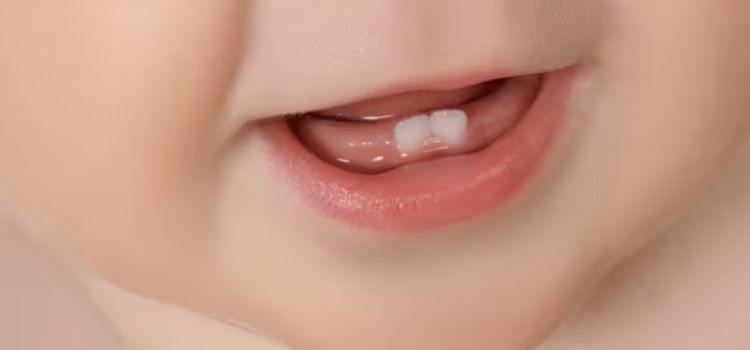As an Amazon Associate I earn from qualifying purchases.
Baby teeth, sometimes referred to as deciduous teeth, play a crucial part in a child’s oral development. As parents, we often ask ourselves a number of questions regarding how our children’s smiles are growing. One such often-asked question Do Baby Teeth Have Nerves?

Since these teeth eventually fall out, many of us assume that they are devoid of any feeling. However, the truth about the nerve supply in infant teeth may surprise you. In this piece, we’ll examine the intriguing world of infant teeth and solve the puzzle of how their nerves function. So let’s take a plunge and discover the secrets held inside those little pearly whites!
A brief explanation of baby teeth and their importance
The initial set of teeth that children develop are called “baby teeth.” The eruption of these teeth starts at six months old and continues until the kid is around three years old. Baby teeth play a number of crucial functions in a child’s developing oral health.
They assist kids in properly chewing their food, which promotes digestion and ensures that they get the necessary nutrients. Additionally, baby teeth are essential for vocabulary development and ensure that permanent teeth emerge into the proper locations. While baby teeth do have nerves, their primary function is to provide a foundation for the permanent teeth that will eventually decide and replace them.
Overview of the topic: Do baby teeth have nerves?
Among the often-asked questions is, “Do baby teeth have nerves?” Yes, infant teeth do have nerves, is the answer. These nerves are in charge of transmitting pain and distress signals that warn the youngster of any potential dental problems. Understanding that baby teeth have nerves underscores the importance of maintaining good oral cleanliness and getting regular dental checkups since it ensures a child’s oral health is in good overall health. Therefore, maintaining the health of baby teeth is essential to maintaining a smile and laying the groundwork for strong permanent teeth.
Explanation of the role of nerves in tooth anatomy
Even in infant teeth, nerves play a crucial function in tooth structure. Baby teeth eventually fall out, but they serve important purposes such as allowing room for adult teeth and assisting in speech development. Baby teeth actually have nerves, despite popular perception.
We may rely on these nerves to provide pain signals to the brain and alert us to potential dental issues or injuries. Therefore, it’s crucial to take care of infant teeth and swiftly address any discomfort or suffering. Making educated judgments regarding their child’s dental health may be made easier by parents and guardians if they comprehend the function of nerves in tooth architecture.
Development of baby teeth:
Explanation of when and how baby teeth start to develop
The second trimester of pregnancy is when baby teeth begin to erupt. The infant teeth’s peaks are already grown and covered by the gums by the time a baby is born. Baby teeth begin to emerge at six months of age on average, however, this might vary from kid to child.
In terms of the nerves in baby teeth, they do indeed have nerves just like adult teeth. These nerves are in charge of giving the youngster feedback and success, enabling them to distinguish between hot and cold temperatures and feel force. Baby teeth must be taken care of since they are crucial for speech development, chewing, and positioning of the permanent teeth.
Discussion of the formation of tooth nerves during the development
The development of tooth nerves plays a crucial function in the development of infant teeth. The first teeth that erupt in a child’s mouth are called baby teeth. Baby teeth actually have nerves, despite popular belief. These nerves are in charge of transmitting sensory information to the brain, such as temperature or discomfort.
The development of dental nerves begins as soon as the tooth buds start to take shape. The nerves rise and develop together with the developing tooth over time, ensuring that the tooth is properly innervated. To properly care for and manage children’s discomfort during the eruption of their baby teeth, dental practitioners must have a thorough understanding of the development of tooth nerves.

Sensation in baby teeth:
Explanation of how babies experience sensations in their teeth
Many parents are curious about how newborns feel in their teeth and whether or not baby teeth have nerves. Yes, infant teeth do have nerves, is the answer. Babies use these nerves, which are similar to those in adult teeth, to sense and react to external stimuli.
Babies’ sensitive nerves are responding to the power and direction of the erupting teeth when they suffer discomfort when teething. Parents may provide the required care and comfort throughout this vital stage of their child’s dental development by understanding how baby teeth experience sensations.
Overview of the role of nerves in transmitting sensations in baby teeth
Do newborn teeth have nerves? If so, how do they help with sensory transmission? Baby teeth do, in fact, have nerves that aid in the transmission of emotions like pain, heat, and tension. These nerves are in charge of alerting the youngster to immoral activity or times of hardship. Parents who are aware of the function of baby teeth’s nerves will be better equipped to look after their children’s oral health and deal with any potential problems.
Dental procedures for baby teeth:
Discussion of common dental procedures performed on baby teeth
Baby teeth need to have dental work done, such as extractions or fillings, to maintain oral health and avoid additional issues. Although baby teeth do have nerves, in order to ensure the child’s comfort, the procedures are usually done under local anesthetic. Children who undergo these operations are given a gentle and stress-free journey by dentists. Understanding the importance of preserving baby teeth and taking care of any dental problems as soon as they arise may help lay the groundwork for good oral health for the rest of one’s life.
Explanation of how nerves are affected during these procedures
The role of nerves in dental operations affecting infant teeth must be understood. Baby teeth have nerves, and some instructions may have an effect on them. A dental filling, crown, or extraction may be necessary to treat a baby’s worn or broken teeth.
The nerves in the baby’s teeth may be impacted by these processes. The dentist will carefully assess the tooth’s structure and choose the best course of treatment to alleviate any pangs or pain brought on by nerve involvement. To ensure that infant teeth and their nerves are being cared for properly and directed in the right direction, it is essential to contact a pediatric dentist who specializes in eating with children.
Tips for managing tooth pain in babies:
Suggestions for alleviating tooth pain in babies
Parents often worry when their children experience tooth pain because they question whether baby teeth have nerves. Thankfully, there are effective solutions to this suffering. Cleaning the baby’s mouth with a soft cloth or baby toothbrush is one of the most important efforts. This aids in the removal of any germs and food debris that can be contributing to the discomfort.
Bringing a cooled teething ring or a clean, damp towel for the infant to chew on may also be soothing. A tiny quantity of infant pain relief gel made specifically for teething babies applied to the painful region may also help reduce discomfort. Decide to speak with a pediatric dentist or other healthcare professional to get further advice and make sure the baby’s oral health is properly handled.

Conclusion
In conclusion, it is undeniable that infant teeth have nerves. Baby teeth are important for the growth of a child’s dental health and general well-being despite being temporary. Baby teeth include nerves that enable youngsters to experience sensations like pain. Which is crucial for their ability to communicate any oral discomfort or problems.
Understanding the significance of baby teeth and their connection to the nervous system emphasizes the need for good dental hygiene and frequent visits to the dentist, even at a young age. Parents may contribute to their children’s dental health and help prepare the way for a healthy permanent dentition in the future by taking good care of their child’s baby teeth.
Amazon and the Amazon logo are trademarks of Amazon.com, Inc, or its affiliates.